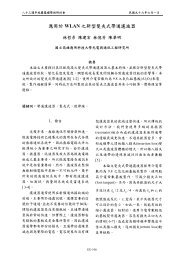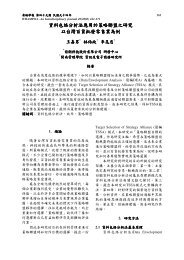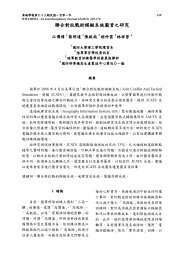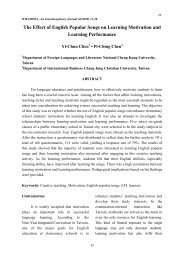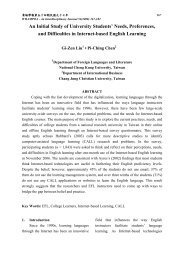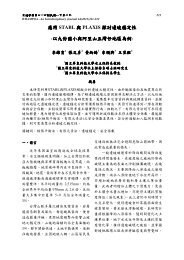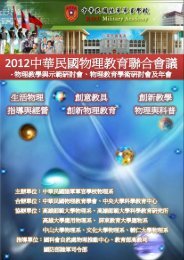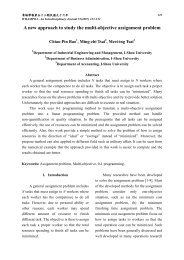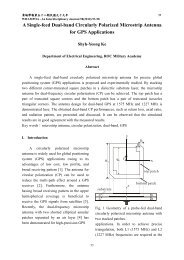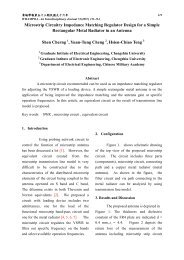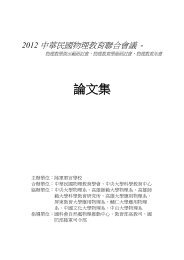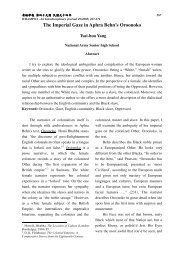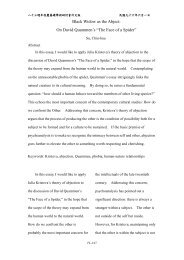Women in Love: the Male / Female Relationships
Women in Love: the Male / Female Relationships
Women in Love: the Male / Female Relationships
Create successful ePaper yourself
Turn your PDF publications into a flip-book with our unique Google optimized e-Paper software.
156 黃 埔 學 報 第 五 十 一 期 民 國 九 十 五 年<br />
of experience for a woman.<br />
The radical strategies to combat this<br />
fear becomes a marked trait of Ursula’s<br />
character shown <strong>in</strong> her frequent demand that<br />
Rupert Birk<strong>in</strong> tell her he loves her, and <strong>in</strong><br />
her desire for Birk<strong>in</strong> but her fears of yield<strong>in</strong>g<br />
“her very identity” to him, know<strong>in</strong>g that he<br />
could accept love only on his terms (178).<br />
The symbolic image of <strong>the</strong> drowned couple<br />
provides ano<strong>the</strong>r negative image of union<br />
and offers evidence of how one partner <strong>in</strong> a<br />
male / female relationship may dom<strong>in</strong>ate<br />
and possibly destroy <strong>the</strong> o<strong>the</strong>r. To Ursula,<br />
Birk<strong>in</strong> seems “a beam of essential enmity, a<br />
beam of light that did not only destroy her,<br />
but denied her altoge<strong>the</strong>r, revoked her whole<br />
world. She saw him as a clear stroke of<br />
uttermost contradiction, a strange gem-like<br />
be<strong>in</strong>g whose existence def<strong>in</strong>ed her own<br />
non-existence” (190). To echo Ursula’s<br />
struggle, Birk<strong>in</strong> <strong>in</strong>sists that “<strong>the</strong> old way of<br />
love seemed a dreadful bondage” (191).<br />
His anger over <strong>the</strong> state of marriage matches<br />
Ursula’s, and <strong>in</strong> response he also embraces a<br />
specific “conjunction where man had be<strong>in</strong>g<br />
and woman had be<strong>in</strong>g, two pure be<strong>in</strong>gs,<br />
each constitut<strong>in</strong>g <strong>the</strong> freedom of <strong>the</strong> o<strong>the</strong>r”<br />
(191). He desires impersonal relations<br />
between earnest <strong>in</strong>dividuals. Lawrence<br />
asserts a similar philosophy <strong>in</strong> his letter to<br />
Ca<strong>the</strong>r<strong>in</strong>e Mansfield:<br />
I am sick and tired of personality <strong>in</strong> every<br />
way. Let us be easy and impersonal, not<br />
for ever f<strong>in</strong>ger<strong>in</strong>g over our own souls, and<br />
<strong>the</strong> souls of our acqua<strong>in</strong>tances, but try<strong>in</strong>g<br />
to create a new life, a new common life, a<br />
new complete tree of life from <strong>the</strong> roots<br />
that are with<strong>in</strong> us. (Letters 1: 359)<br />
Birk<strong>in</strong>’s <strong>the</strong>ory of “star equilibrium” takes<br />
its <strong>the</strong>matic cue directly from Lawrence’s<br />
own dream of a healthier, less anxious<br />
exchange between lovers and friends.<br />
Birk<strong>in</strong> persuades Ursula to establish<br />
a union where each commits to <strong>the</strong> o<strong>the</strong>r<br />
while ma<strong>in</strong>ta<strong>in</strong><strong>in</strong>g <strong>the</strong> <strong>in</strong>tegrity of <strong>the</strong> self.<br />
Ursula, however, prefers her own approach<br />
to human affection, and tries to provoke<br />
verbal declarations of love from Birk<strong>in</strong>.<br />
Ursula asks Birk<strong>in</strong> so often to confirm this<br />
spiritual dimension of <strong>the</strong>ir relationship that<br />
Birk<strong>in</strong> calls <strong>the</strong> question her war-cry: “’A<br />
Brangwen, A Brangwen,’--and old<br />
battle-cry.--Yours is ‘Do you love<br />
me?--Yield knave, or die’” (WL, 244).<br />
Despite her yearn<strong>in</strong>g to be loved and her<br />
<strong>in</strong>sistence on <strong>the</strong> supremacy of love over <strong>the</strong><br />
<strong>in</strong>dividual, Ursula is fearful that she will be<br />
consumed by him, and she sometimes<br />
becomes aggressive <strong>in</strong> her resistance to such<br />
envelopment. Lawrence cast Ursula as <strong>the</strong><br />
modern woman with grasp<strong>in</strong>g qualities of<br />
<strong>the</strong> modern cultural degeneration. When<br />
Birk<strong>in</strong> comes to propose to Ursula and ends<br />
up do<strong>in</strong>g so with her fa<strong>the</strong>r <strong>in</strong> <strong>the</strong> room,<br />
Ursula-- flustered, “driven out of her own<br />
radiant, s<strong>in</strong>gle world” by <strong>the</strong> unexpected<br />
proposal--cries out to both men, “why<br />
should I say anyth<strong>in</strong>g?. . . You do this off<br />
your own bat, it has noth<strong>in</strong>g to do with me.<br />
Why do you both want to bully me?” (253).<br />
Her contrar<strong>in</strong>ess about whe<strong>the</strong>r she is <strong>the</strong><br />
owner or <strong>the</strong> owned is succ<strong>in</strong>ctly illustrated<br />
by a s<strong>in</strong>gle sentence from her consideration<br />
of Birk<strong>in</strong>’s proposal: “Let him be her man<br />
utterly, and she <strong>in</strong> return would be his<br />
humble slave--whe<strong>the</strong>r he wanted it or not”<br />
(258).<br />
Ursula tries to f<strong>in</strong>d <strong>the</strong> balance that<br />
allows her to be so close to Birk<strong>in</strong> but not<br />
with <strong>the</strong> sacrifice of her <strong>in</strong>dependent soul.



